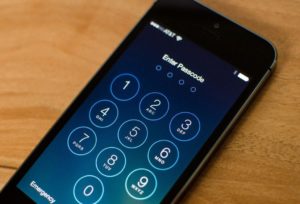
Image courtesy of iMore.com
Smartphones have increasingly become important aspects in our everyday lives. Likewise, they’ve become necessary tools for law enforcement officials working to solve a crime.
On Wednesday, the case of a man accused of aiming his cell phone under a woman’s skirt and snapping a photo led a Florida appeals court to rule that officers can legally force a suspect to provide them with the passcode to their cell phone in order to access potentially incriminating evidence.
According to Courthouse News, voyeurism suspect Aaron Stahl initially gave authorities permission to search his iPhone 5, which presumably contained photos from his alleged act. Stahl, however, later reneged on his consent and refused to give police the four-digit passcode required to unlock his phone.
By this time, officers had obtained a search warrant, but it was rendered useless as they were still unable to crack the code to the suspect’s phone. Through trial and error, police could’ve entered the 10,000 possible number combinations for the code. However, more than 10 failed attempts would’ve permanently locked the device and erased all its stored data.
This summer, authorities were faced with a similar situation following the San Bernadino shooting when the FBI sought potential evidence thought to be stored in the shooters’ iPhone. The case slightly differed from Stahl’s, however, in that the suspects were deceased, so police had little to no way of getting their hands on the passcode.
The question of whether police can force such information has been raised multiple times in the past, with state courts ruling authorities aren’t allowed to do so. The Florida Court of Appeal’s Second District, however, took a different route.
Courthouse News reported that a trial judge last week denied the state’s motion to compel Stahl to provide his password, ruling that it would be tantamount to forcing him to testify and incriminate himself, thus violating the Fifth Amendment. But on Wednesday, the Court of Appeals overturned the ruling, finding that the password was not related to any criminal photos or videos found on Stahl’s device.
“The information sought by the state, that which it would require [the defendant] to provide, is the passcode,” Judge Anthony Black wrote in his opinion.
“The state has not asked [Stahl] to produce the photographs or videos on the phone. … By providing the passcode, [he] would not be acknowledging that the phone contains evidence of video voyeurism,” the judge continued. “Moreover, although the passcode would allow the state access to the phone, and, therefore, to a source of potential evidence, the state has a warrant to search the phone. The source of evidence had already been uncovered.”
The appeals court also went on to argue that because smartphone users who utilize fingerprint-based passcodes can easily be compelled to surrender their information for fingerprint checks, voice samples, etc., Stahl should also be required to provide his passcode to the state. It indicated a clear difference between information a suspect knows and information they have or are.
“We are not inclined to believe that the Fifth Amendment should provide greater protection to individuals who passcode protect their iPhones with letter and number combinations than to individuals who use their fingerprint as the passcode,” Black’s opinion read. “Compelling an individual to place his finger on the iPhone would not be a protected act; it would be an exhibition of a physical characteristic, the forced production of physical evidence, not unlike being compelled to provide a blood sample or provide a handwriting exemplar.”
The judge concluded by stating the case was not one of testimony but of surrender.


